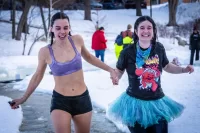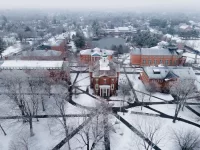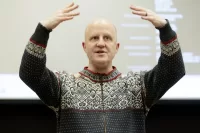
When Aanika Patel ’25 of Needham, Mass., arrived at Bates, she expected the experience to be, as oft-described, the best four years of her life.
Patel soon realized that her time in college wasn’t about chasing a superlative, but instead paying attention to all the moments, both ups and downs, that form the Bates experience — and make a campus not just another place, but a home.
For Patel, who will deliver this year’s Senior Address, the memories that stand out the most are those characterized by human connection and a sense of place — the joy of reuniting with her best friend in Commons after study abroad, watching first-year students fearlessly join the club women’s soccer team she co-created, and, two years ago, being inspired while listening to her friend Rishi Madnani ’23 offer the Senior Address.
How to Watch Commencement
Livestreamed on the Bates website and the Bates Facebook page, the Bates Commencement ceremony begins at 10 a.m. on Sunday, May 25, with live coverage beginning at approximately 9:30 a.m.
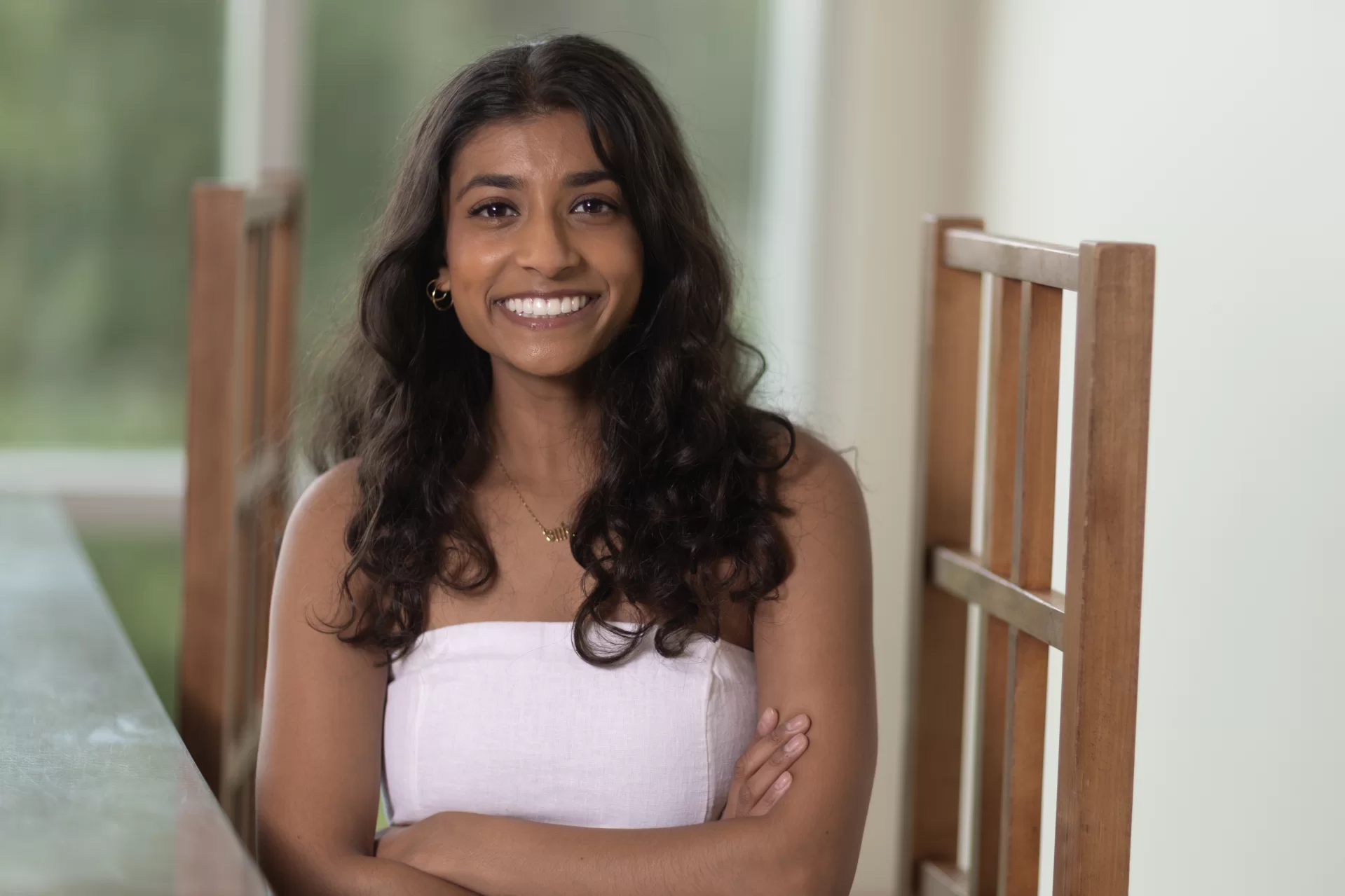
And, as she’ll talk about in her speech on Sunday, the power of place came through during a transformational hike up Mount David in the dead of winter for a class.
Such moments, and the skills and relationships that they beget, are key resources in preparing to embrace life beyond Bates, Patel says.
Alexandra DeMarco of Bates Communications and Marketing spoke recently with Patel. The following is a condensed and edited version of their conversation.
First things first, could you tell me about why you wanted to give the senior speech?
The former president of the South Asian Student Association, Rishi Madnani ’23, gave the Senior Address two years ago. I remember sitting there, watching him reflect on his time at Bates. I was moved at how he captured the Bates experience and the influence it has on a person. Since then, I’ve hoped for the opportunity to do the same. I love our class and wanted the chance to honor how much the people and moments here have been fundamental not only to my experience in college, but also the person I will be out in the world.
What is your theme?
Place and the environment.
My sophomore year, I took “Politics of Wildlife Conservation” with [Clark A. Griffith Professor of Environmental Studies] Sonja Pieck.
I sat in that class and in the second week, something just clicked for me. I was like, wow, everything is so interconnected. All living things exist because they are reliant on each other, and in the case of that course, it was that national parks are influenced by socio-political, economic, and scientific factors. These connections are what can make or break an environment, because all actants have their own histories, too.
My speech talks about how “place” is a network of connections, relationships, and histories. You watch how land is impacted by those who interact with it and how. Bates carries the histories of all the people that are a part of this campus. It’s what makes it so special, and is something that will influence you in the future, too, whether or not you’re conscious of it.
Could you talk about how that interconnectedness that you discovered in environmental studies is mirrored at Bates?
The people at Bates are the distinguishing factor. That’s what makes Bates so interconnected — the kindness and the warmth of people, the willingness to go put yourself out there and know that there are people that have your back.
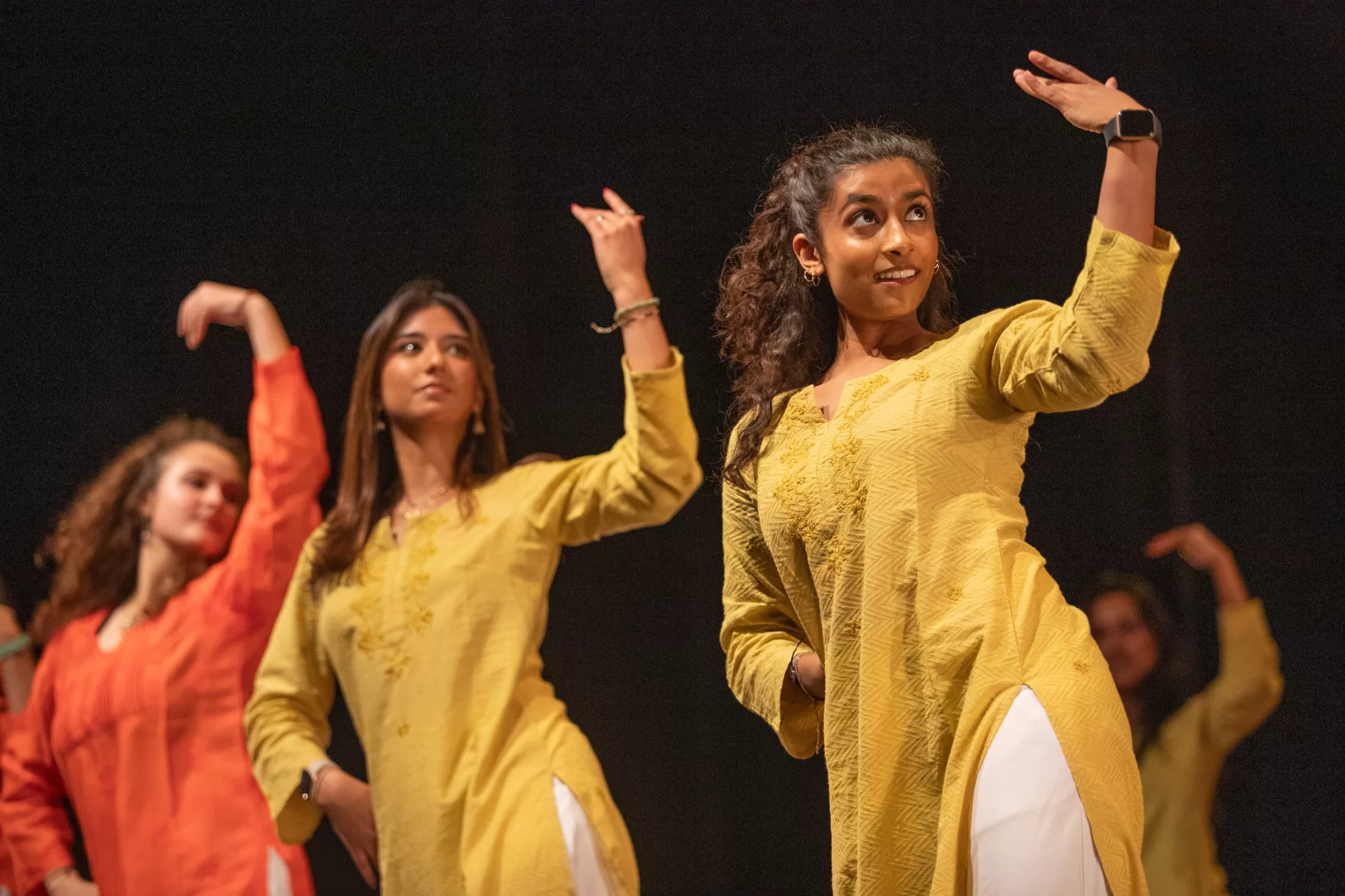
You see that in all walks of life here at Bates. You see it on the sports teams, and you see it in the arts culture and the theater department. You see it in the classroom, and everybody brings their background and their experiences. There seriously is very little judgment when you interact with a Batesie. It’s always about learning from each other and learning from what each other has to offer. That’s what makes Bates so special.
Did that theme find its way into your senior thesis?
Yes! My thesis is on the intersection between pathogens, people, and the environment as actants. Cholera is an endemic bacterial disease in the Ganges River and Delta, and it’s a continued cause of sickness and death despite having been eradicated in the Global North world. I looked at the policy that’s been implemented to clean the Ganges River — the Namami Gange Programme — and what might be missing that encourages this disease to continue.
The Ganges is a very sacred river in India and a body of water I grew up hearing about. So my thesis started off with asking why cholera continues to exist in that river. From there, I looked at the socio-political and economic dimensions of how people have addressed bacterial and infectious disease and contamination in other places in the world.
There are a lot of nuanced relationships on why the disease might continue to exist. Some of them are religious, some of them are rooted in colonialism, and also just how densely populated the region is. Basically, though, the areas to manage this issue are not connected. The cleaning of the river is not associated with health management, and health management is not associated with caring for the river’s environment.
I basically determined that the Namami Gange Programme does not address the “why” component for wanting to clean the Ganges river in the first place: the cholera pathogen. I applied elements of the hydrosocial cycle and posthuman mutualism to center the pathogen as the thing that binds people, pathogens, and the environment together and evaluated how the existing policy does and does not do that.
The Ganges River being dirty is inherently a people problem. Cholera continuing to spread is inherently a people problem. But the way to solve it is actually acknowledging the complex relationships between the human and nonhuman and how they interfere with water management.
Sonja Pieck was my advisor, and she was incredibly, incredibly resourceful and helpful for this project. She was so supportive and understanding, and we were able to talk theory forever. At Bates, I’m really lucky in that sense of having that unique model of an individual advisor that really cares about my thesis and my ideas.
Why did you choose to research the Ganges River for your thesis?
I’ve always been interested in public health. What I really, really wanted to do was to write about India. My parents instilled in me a love for my heritage and ensured that I always had this connection with India regardless of where I grew up. Their dedication to my cultural upbringing is what inspired this thesis and the want to give back to a place that makes up so much of who I am.
What are some of the lessons that stick out to you that you’ve learned from your peers, your professors, and other community members?
This year, I took part in co-founding the women’s club soccer team with a handful of friends. What I learned most from the experience wasn’t actually getting the team off the ground, but watching a few freshmen who joined the team and had never played soccer before. They put themselves out there in a completely new environment, and it was incredible to witness.
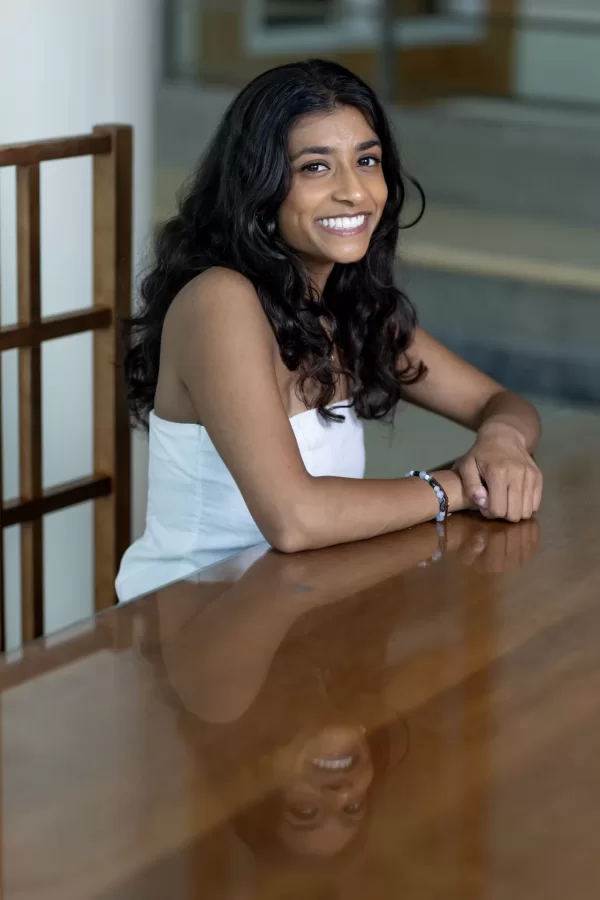
I saw all my friends getting together to try and make a supportive and welcoming environment for the team. That kind of culture, where people genuinely look out for each other, feels uniquely Bates. Another one is persevering and sticking through whatever gets thrown your way. Sophomore year, Hoi Ning Ngai, [director of employer engagement and business advising at the Center for Purposeful Work], really became a mentor.
What I learned from her is that in any place that you end up in, not everything is going to be perfect, but it’s what you make out of the things that are put in front of you — what you take away from each experience and how you carry it with you to the next one — that is seriously important.
You have completed a couple of internships while you’ve been at Bates. What would you say to fellow students and incoming students about the value of internships?
Internships give you a perspective of learning, skill-building, and working with people that you can’t really get in a classroom environment. They produce and force you to get experience. Every internship that I had, I used it as a jumping point to the next opportunity, and I learned a lot about myself along the way.
You are very passionate about environmental studies, and you also have a business mind. Could you tell me about how those two interests intersect for you?
I picked environmental studies as a major because it teaches you a mindset of awareness of the things around you and how you can improve them, even when it seems out of reach, and what tools might be necessary to get to that point. Business is the same type of problem solving just in, perhaps, slightly different contexts. I seriously believe that a lot of the issues the planet faces can be boiled down to people and the things that they face, and business is a way to understand that in a grounded way.
You studied abroad in Stockholm and London. What were those experiences like, and what can you say about the value that studying abroad added to your educational experience?
I lived in Sweden for a year when I was younger, so going back to Stockholm, specifically, was like rediscovering a part of myself that I left there. Even though I only studied abroad for four months, I learned so much about what it means to be present and experience yourself in the contexts of a new place. You are so uniquely out of your comfort zone that afterward, everything else doesn’t seem as big and scary as it used to be. You learn to rely on just you and what you have to navigate the new place you’re in.
I tell everybody, all the underclassmen I know, to go abroad. Finding that sense of place in the foreign environments you’re put into shows just how capable you are. I was reminded how to be curious and stay grounded.
What role have extracurricular activities played in forming your community at Bates?
Aside from women’s club soccer, I’m also president of the South Asian Student Association and president of the Bollywood Dance Team. It’s really cool to see how much Bates has an interest in supporting students of color on this campus as well as just various cultures.
What I loved and wanted as part of my college experience was to have a connection to my heritage. Coming here and meeting people that cherish their South Asian culture in the same way brought a feeling of home to this campus.
Bollywood Dance is my creative outlet. I grew up doing Indian Classical Dance (Bharatnatyam, Odissi, and Kuchipudi), so coming to Bates and learning a new, more modern style of dance was an exciting challenge. I have this belief that everyone knows how to dance. As long as you’re willing to put yourself out there, there’s really nothing to be afraid of.
During the SASA mock wedding each year, we teach dances to everyone who wants to get involved. In South Asian weddings, it is really common for family members and friends of the people getting married to do dances. I got “married” this year, and it was so much fun to dance alongside my friends.
What characteristics have you come to value in the people around you?
Warmth, kindness, sense of self, and groundedness. At Bates, people are uniquely proud of what they offer, and I admire how much people are excited to share with others who are interested in learning.
My parents are very driven and have been incredible role models. They really inspired me to find a sense of place in my culture, as well as the other spaces I might end up in. They’ve always encouraged me to have these experiences with others and give back to the communities that have contributed to my success. That’s something I want to do with my life, with my job, with my degree.
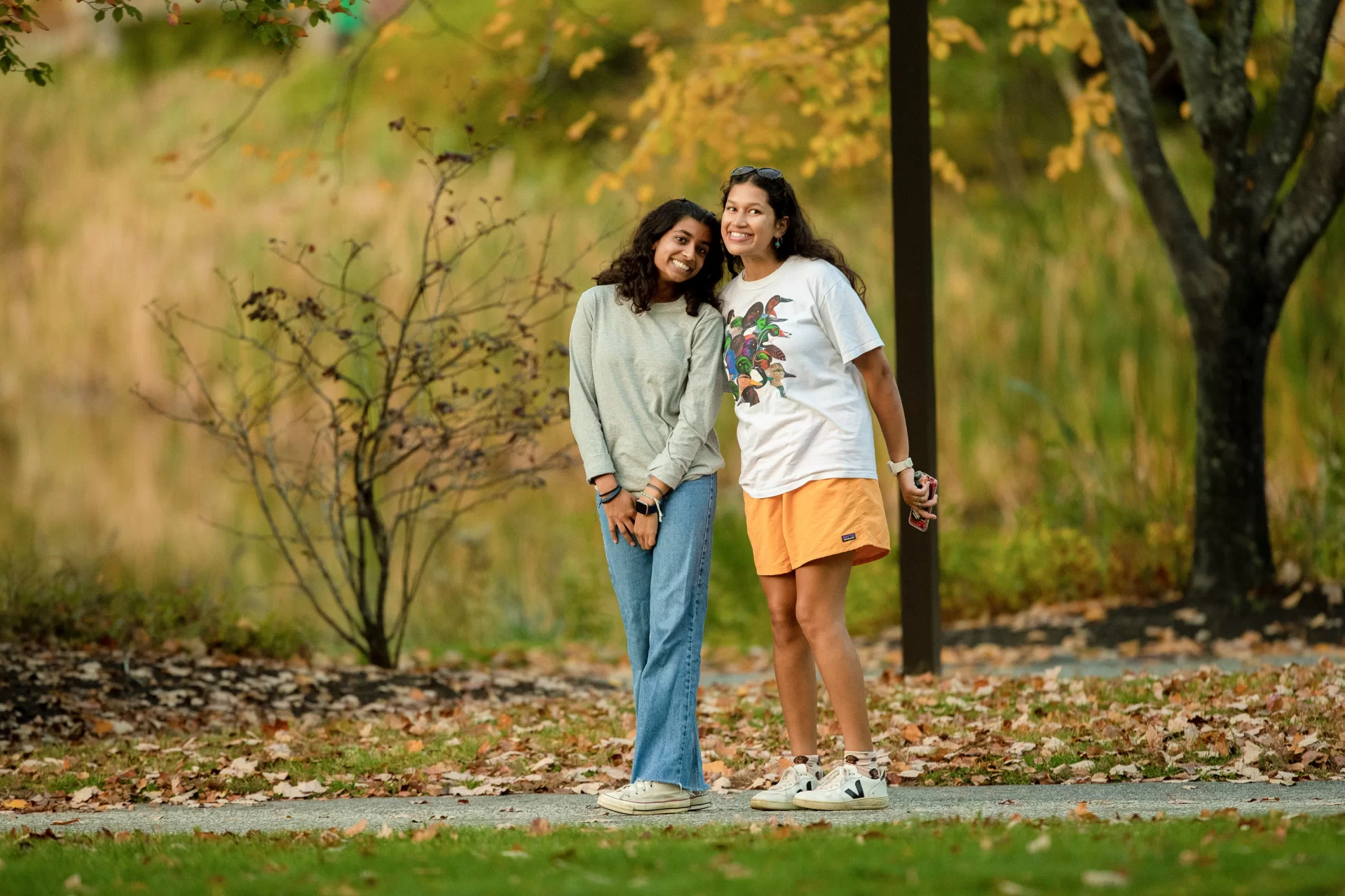
Do you have any advice for incoming students?
What helped me get through Bates successfully was the friendships I made with upperclassmen. The way you can do that is by putting yourself into club spaces and being proactive as a freshman. The other piece of advice I have is enjoying your college experience for everything that it offers. For me it looked like venturing out into nature having never been comfortable with it.
I came into college thinking, “These are going to be the best four years of your life, period.” As I went through college, though, I realized that that’s too much pressure to put on four years, but I can still find positives or joy and excitement in the little things that are in front of me. I learned to love going on long hikes and spending hours out at night stargazing, I learned to pause and appreciate the things around me that are so much larger and have been there so much longer than I have. Those little things are incredibly special to the place and the time that you’re at.
If you could pick one moment that defines your Bates career, what would it be?
I met my best friend at Bates on minute one of move-in day freshman year, right before my parents left.
When I came back to Bates after studying abroad, when I saw her in Commons — that was the loudest I’ve ever shrieked. Everyone was staring. I just gave her the biggest hug.
Why I say it defines my Bates career is because the friendship withstood time. I realized how much the people are the place, and it was a core memory for me.
You have postgraduate plans — you’ll be an energy consultant at the global energy analytics firm Wood McKenzie. At this moment in your life, how would you describe your aspirations for the future?
I just want to make an impact in the world. I want to do good for people in some way, shape, or form.
I really hope that I start forming my own community and family the way that my parents have. This year, I’ve really learned that having your people makes your moments and achievements worth celebrating. That love is what keeps you going.
In the future I hope to dedicate my career to helping people. I want to make sure that what I did and what I learned makes an impact on other people’s lives, as much as my education and my upbringing has made on me.
